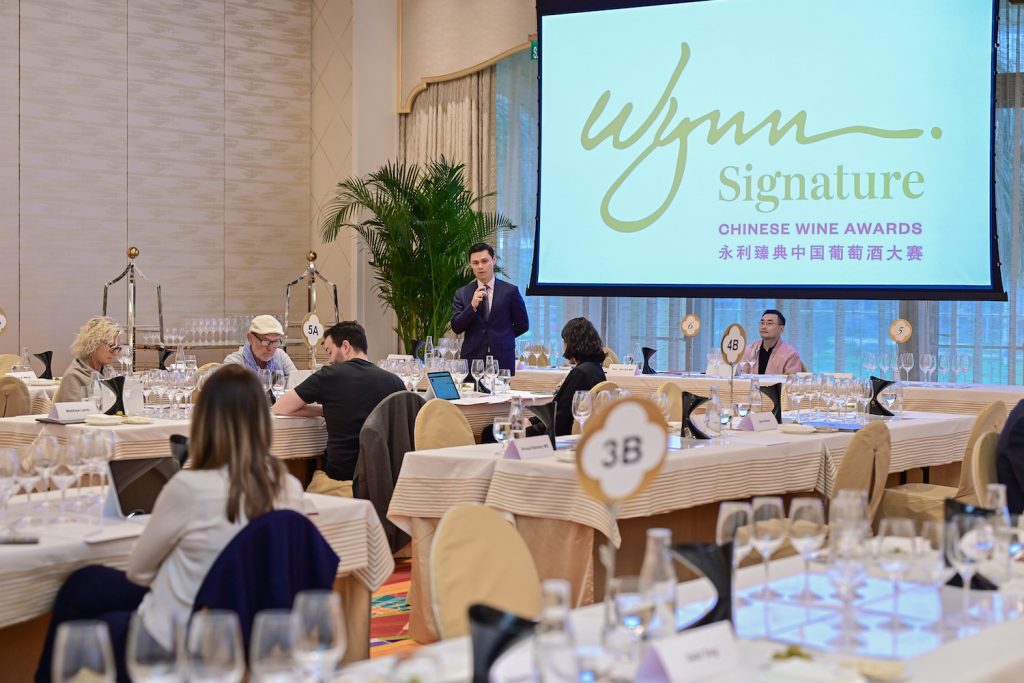Annabel Jackson reports from Macau on the inaugural edition of the competition that seeks to give local winemakers critical feedback from outside experts, and around which there is a buzz.
The gold medal and trophy winners at the inaugural Chinese Wine Awards 2024, held in Macau, at Wynn Palace, in March, were announced at a glossy gala dinner in the hotel’s ballroom in April.
The results are as follows:
Best Wine of China – Fei Tswei Marselan Reserve 2021 (Ningxia)
Best Red Wine – Fei Tswei Marselan Reserve 2021 (Ningxia)
Best White Wine – Xige Estate N28 Chardonnay 2021 (Ningxia)
Best Sweet Wine – Domaine Franco Chinois Petit Manseng 2018 (Hebei)
That the region of Ningxia dominated the awards, alongside two of the country’s most promising grape varieties, Marselan and Petit Manseng (relative outsiders elsewhere), was perhaps not surprising. But this was the inaugural event, and the first competition to showcase exclusively made-in-China wine, but outside China. Other highlights included (Best Chardonnay) Château Nine Peaks Qi Chardonnay 2021, and (Best Other Dry White) Longting Vineyard Reserve Petit Manseng 2020, both from Shandong. The total of nearly 800 entered wines is sure to grow significantly for the 2025 edition, showcasing an even broader spectrum of regions and varietals.
Shandong is considered the home of modern Chinese winemaking (Changyu was established here in 1892); and the buzz around Ningxia continues, with Silver Heights a ground-breaking pioneer. But there’s an ever increasing amount of international cooperation, not to mention French investment, which will increasingly influence industry development. Long Dai winery in Shandong is owned by Château Lafite Rothschild; and luxury group LVMH founded Ao Yun in Yunnan Province – which insiders say is a key region to watch.
The awards were established, and chaired, by winemaker Eddie McDougall, founder of The Flying Winemaker, a neo-négociant which currently operates in New Zealand, Australia, and South Africa. Australian-born McDougall, who lives in Macau, has been tasting made-in-China wine for many years, but it was when researching for, and fronting, the Discovery Channel 2013 Asian wine-and-food show, The Flying Winemaker, that he began to envision China as a seriously emerging modern winemaking country.
As outreach for the Chinese Wine Awards, a small team of wine experts in Macau toured around Chinese wine regions and estates to spread word of the competition, and encourage entry. Critically, no entry payments were required or accepted, by either individual producers or regional officials. This factor was considered an important element of event protocols in order to level the playing field as much as possible, and at the same time allow for high levels of transparency.
For the panel, McDougall was able to attract high-profile judges including Jane Anson; author of The Chinese Wine Renaissance, Janet Wang; Tim Triptree MW (International Director of Wine & Spirits at Christie’s); the first Chinese Master of Wine Gus Zhu MW; Kenichi Ohashi MW from Japan; Andrew Caillard MW from Australia; and, from Hong Kong, Reeze Choi, who made history last year by becoming the first Chinese finalist in the ASI Best Sommelier of the World Competition (he placed third).
McDougall is certain that in order to achieve ever higher quality, and gain global notoriety, wine producers need to be able to receive critical feedback from experts outside their own countries. In the broader scheme of things, where the results of internal wine competitions judged by nationals often differ widely from the results announced by international competitions judged by global judges, this show might represent an interesting precedent.
The Chinese Wine Awards, about which there is a distinct industry buzz in the region, is also part of government tourism policy to move Macau beyond gambling activity, to become a more diversified and inclusive destination. It is already becoming a notable culinary destination – a fact mentioned by Gordon Ramsay, who runs the eponymous Bar & Grill in The Londoner hotel, during a visit earlier this year. As well as having more five-star hotels than London, which used to top the list of the league, Macau is home to 16 Michelin-starred restaurants (plus one with a green star), including a pair with three stars: Jade Dragon in the City of Dreams, and Robouchon au Dôme at Grand Lisboa.
In part due to its Portuguese colonial past, Macau itself has a surprisingly wide and established wine-drinking culture, with wine available in even casual Cantonese restaurants, and in almost all supermarkets and corner-stores. Macau remains important for the Portuguese wine industry – Wines of Portugal’s most recent figures put the country as second in volume (after Australia); and fourth in value (after Australia, France and USA). As an additional part of the tourism package, casino-operated hotels are required to offer 15% of Portuguese labels on their wine lists, so it is not difficult to find top-notch Vinho Verde such as Solheira, or a Luis Pato label from Bairrada, offered by-the-glass in hotel restaurants and bars.

